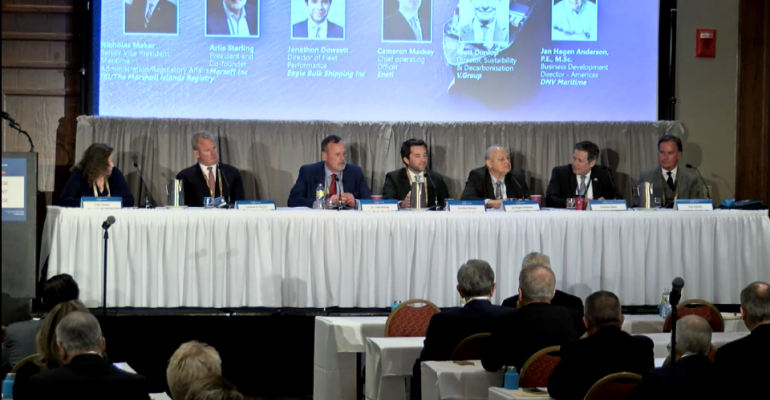Speaking at CMA Shipping 2022 on the panel "The Journey to Zero Carbon – Accelerating Change", leaders from the maritime industry shared their views on the multifaceted challenge of decarbonising the sector.
Arlie Sterling, President and Co-Founder, Marsoft Inc. saw hydrogen as the basis for the fuels of the future, claiming that EU and US government investments in hydrogen technology signal the direction the world will take.
“Pay attention to where the Biden administration is putting its money, and I think you'll learn a lot about where we'll be in 2040,” said Sterling.
If industries are successful in transitioning to hydrogen as a fuel, that transition implies a significant reduction in vessel demand for certain sectors of the maritime industry as logistics chains are altered. If such a change to market fundamentals were to occur, maintaining the value of existing ships through optionality and operational flexibility would be important, said Sterling.
Matt Dunlop, Director, Sustainability & Decarbonisation, V.Group and strategic partner to the Mærsk Mc-Kinney Møller Center for Zero Carbon Shipping said that the center had yet to identify a frontrunner fuel at this stage of the transition, but that LNG had become the bridging fuel of choice.
“Currently, we have at least five candidates for future wide use of chemical fuels including hydrogen, ammonia, methanol, methane and bio-oil,” said Dunlop, all of which faced their own challenges across feedstock availability, fuel production, storage, bunkering, safety, and regulations.
“The chosen energy solution needs to be sustainable with a validated well-to-wake emissions footprint… There are a number of levers we can pull regarding energy efficiency onboard our ships right now to reduce emissions and technical and operational efficiency. Those are readily available, but there's no consistency and we need a blueprint,” said Dunlop.
Jonathan Dowsett, Director of Fleet Performance, Eagle Bulk Shipping Inc. said that the energy transition is mostly about moving from hydrocarbons to green electrons.
“I would say so we don't really have enough green electrons to make any of the zero carbon fuels we're talking about right now. So really, the first order of business will be scaling our ability to produce electrons because without those we won't be able to generate these fuels at the scales we're going to need for the for the industry to transition,” said Dowsett.
Eagle Bulk has yet to place its bet on future fuels, but has partnered with organisations to help inform its eventual decision.
“If we were to order a new build ship today, it would hit the water probably in 2024-2025 and it would be sailing right up to 2050, by which time we should either have cut 50% of absolute CO2 out of the industry, or most likely 100%. Frankly, I think that’s terrifying, to have a ship that is conventionally designed, that will need to be 50% or 100% carbon abated by 2050.”
Regional and global regulation was a strong theme in the discussion, and Cameron K. Mackey, Chief Operating Officer, Eneti, said that he believes Eneti has survived as long as it has because of its ability to deal with complex regulation.
“Balkanization means the breakup of any sort of comprehensive or consistent set of rules or standards or ideals. If we all agree that the neighbourhood is going to be shrinking then the question is how do you stay the best or keep the best house in a declining neighbourhood? The answer is you have to welcome embrace and thrive on the complexity and the balkanization of rules.
“Nobody's going to wait for the IMO. The EU isn't going to wait for the IMO, the US isn’t going to wait for the IMO, emerging markets aren't going to wait for the IMO. All these competing standards and all the competing tools have to be navigated by someone. And the reason we're in this position is we're probably better than many at navigating that complexity,” said Mackey.
More complex regulation means higher barriers to entry for the industry, and Eneti looks forward to the complexity and the opportunity to figure it out better than others.
Copyright © 2024. All rights reserved. Seatrade, a trading name of Informa Markets (UK) Limited.
Add Seatrade Maritime News to your Google News feed.  |

